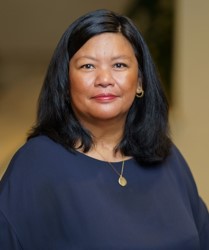Dear Colleagues,
Earlier this month, I attended the world premiere of Taking Root: Southeast Asian Stories of Resettlement in Philadelphia, a new documentary by filmmaker, organizer, and gender and racial justice movement leader Oanh-Nhi Nguyen. The film chronicles the story of Southeast Asian refugees displaced by U.S. imperialism and militarism and the ways in which they organized in Philadelphia to build new communities and lives together. Told through powerful interviews conducted by VietLead youth organizers, Taking Root reminds viewers both of the importance of community organizing and of the countless ways in which global systems of oppression displace people and communities.When we embarked upon the journey of designing our new Theory of Change in early 2022, immigrant justice and other movement leaders involved in the design process were unequivocal in their conviction that any strategy supporting immigrant and refugee communities must be rooted in a global analysis. Many of those leaders underscored that we operate in a fundamentally unjust global economic and political system that relies on the exploitation and oppression of migrants worldwide. Those we engaged in the strategy design process also found significant value in applying a global lens to GCIR’s work, and saw this as a ripe opportunity to strengthen GCIR’s commitment to addressing the global forces that cause people to move. And they emphasized that there is much to be gained from connecting the immigrant justice movement in the U.S. to the global struggle to dismantle systems like white supremacy, racial capitalism, and anti-Blackness, and in strengthening ties to transnational movements for climate justice, gender justice, worker justice, and racial justice.
For these reasons, GCIR is exploring what it means to do our work as a philanthropic mobilizing organization at the transnational and global levels. Right now, we are deep in learning mode so we can better understand the most impactful role we can play in supporting and amplifying transnational organizing, power building, narrative, and advocacy work. To that end, late last year we launched a staff-led Political Education Working group which is developing a learning agenda that will deepen our understanding of the political, social, and cultural systems impacting migrants across the globe, including – among others – racial capitalism, imperialism, militarism, and anti-Blackness. Earlier this year, we met with Harsha Walia, a Canadian activist and writer who has been involved in anti-colonial and anti-capitalist migrant justice movements for the past two decades. We are currently reading articles about the connections between Black liberation and immigrant justice and the ways in which each is fundamentally tied up in the other. And we are learning alongside movement leaders and other philanthropic intermediaries who are applying an intersectional and global lens to their strategies, approaches, and practices.
As we continue to learn, a central question for the GCIR team is how to connect transnational and global work to strategies at the local, state, and national levels in the U.S. We know that many of your grantee partners have been connecting these dots for years, and we are eager to amplify not only their strategies but also the opportunities they see on the horizon. We are excited to partner with you and with them in our purposeful learning as we consider the many ways philanthropy can help facilitate transnational collaboration and address global forces impacting migration and displacement.
In solidarity,
Marissa
